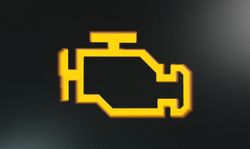4 Reasons for the 'Check Engine' Light Coming On

Paying attention to the lights that illuminate on your dashboard is essential to vehicle maintenance. The ‘check engine’ light is less straightforward than the transmission light, for example—and can indicate a number of potential problems. The guide below looks at some of the most common.
Why Is Your ‘Check Engine’ Light On?
1. Loose, Broken, or Missing Gas Cap
The gas cap creates a seal that prevents toxic fumes from exiting your fuel tank while helping regulate tank pressure. When it is loose or if it sustains damage, you will lose fuel through evaporation and unwittingly allow emissions to enter the atmosphere even when the car is off. Try tightening yours to see if it is the culprit. If it won’t fully fasten, invest in a new one.
2. Faulty Oxygen Sensor
 Responsible for measuring oxygen in your car’s exhaust system, the oxygen sensor also detects how much fuel gets burned. An old or faulty O2 sensor cannot send the right air-fuel mixture information to the car’s computer, causing the engine to burn excessive amounts of fuel and lower your gas mileage.
Responsible for measuring oxygen in your car’s exhaust system, the oxygen sensor also detects how much fuel gets burned. An old or faulty O2 sensor cannot send the right air-fuel mixture information to the car’s computer, causing the engine to burn excessive amounts of fuel and lower your gas mileage.
Too much oxygen in the engine cylinders can also inflict heat damage on the spark plugs, causing the motor to possibly catch fire. Get the sensors replaced to avoid fuel economy, emission, and safety problems.
3. Old Spark Plugs
Spark plugs seal the engine combustion chamber and provide the ignition the air-fuel mixture in the cylinders need to start the car. Old spark plugs cause power issues, including engine misfires and hesitations.
Unless your car features a diesel engine that does not require internal combustion to start, get your spark plugs replaced regularly according to manufacturer recommendations as part of vehicle maintenance. New spark plugs can last up to 100,000 miles.
4. Bad Mass Airflow Sensor
This sensor determines the amount of air in your engine, ensuring the part receives the right amount of fuel to operate efficiently. If it fails because of a clogged or incorrectly installed air filter, the engine will use too much fuel and, therefore, lower gas mileage.
A bad mass airflow sensor can also cause heat damage to other auto parts, such as the catalytic converter, by allowing too much oxygen into the engine’s combustion chamber. Excessive oxygen in the chamber will cause it to explode. Have the air filter or the sensor replaced to fix the problem, depending on the degree of damage.
If your ‘check engine’ light turns on, schedule vehicle maintenance with Hillis 66, Inc., the auto repair shop serving Lincoln, NE, and the surrounding areas since 1975. They are dedicated to timely, quality service and affordable prices. Call (402) 474-2891 today to make an appointment. Learn more about their capabilities online. Get additional auto maintenance tips on Facebook.
About the Business


